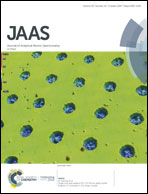Probing a chemical state during ultra low impact energy secondary ion mass spectrometry depth profiling
Abstract
A procedure to probe a chemical state during ultra low impact energy secondary ion mass spectrometry depth profiling is presented. For impact energies in the range of 90–150 eV the sputtering process is significantly different from a standard SIMS experiment (impact energy of 1 keV and above): each primary ion carries so little energy that breaking of strong covalent bonds is inefficient. Thus, formation of polyatomic ions is enhanced but only if atoms which are part of these ions have been bonded and not only located in a vicinity to each other. This can be used to obtain qualitative information about the types of bonds present in a sample. Annealed titanium and indium films deposited on silicon dioxide have been compared. The procedure reveals formation of oxides but in the case of titanium a clear indication of silicide formation can also be seen. The procedure is therefore beneficial for analysis of phenomena occurring at the nanoscale.



 Please wait while we load your content...
Please wait while we load your content...